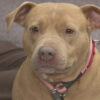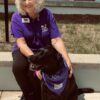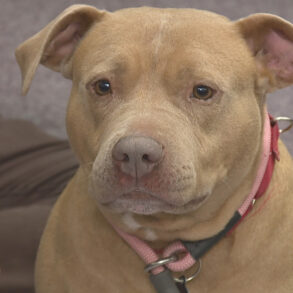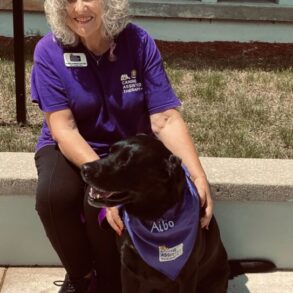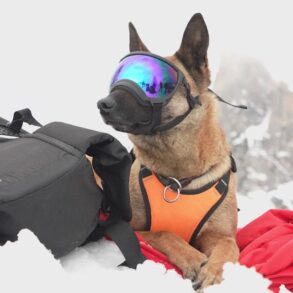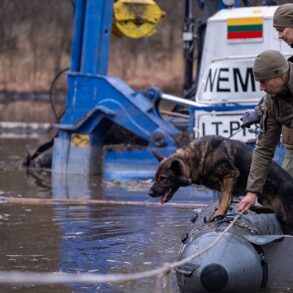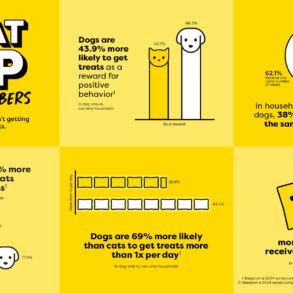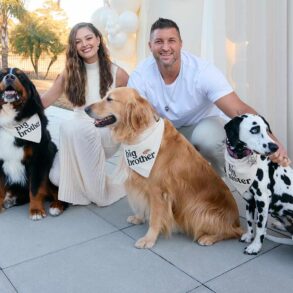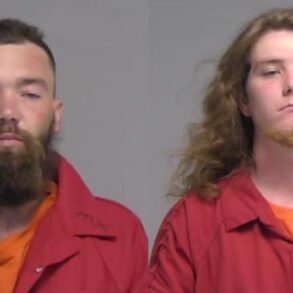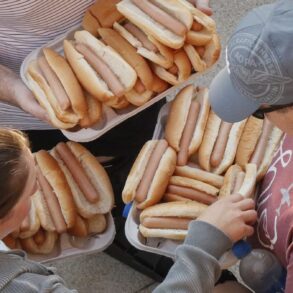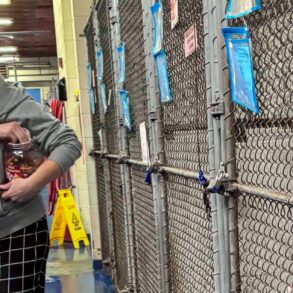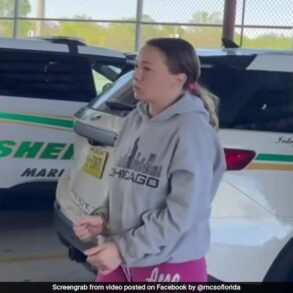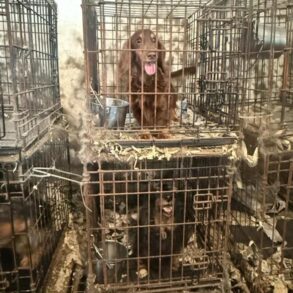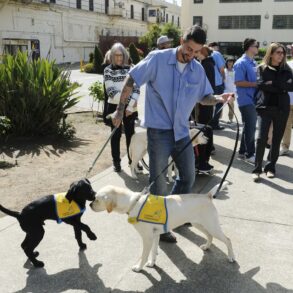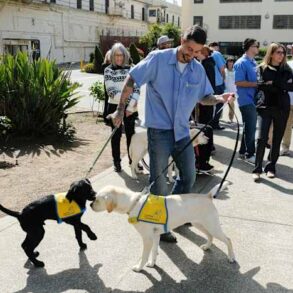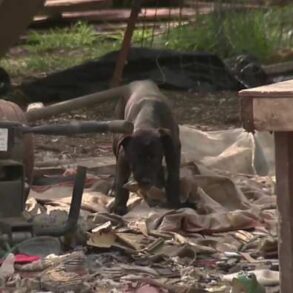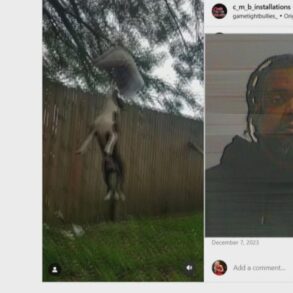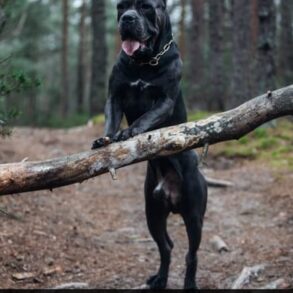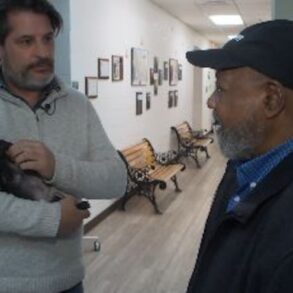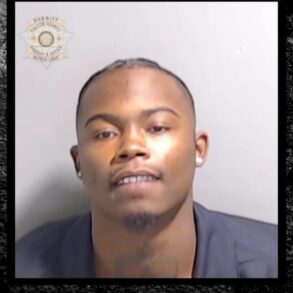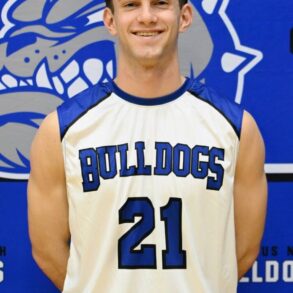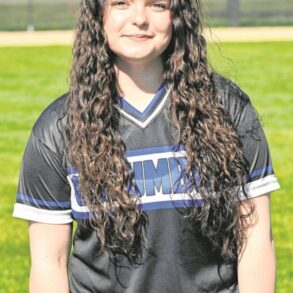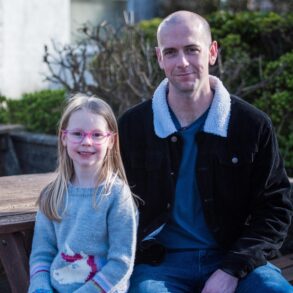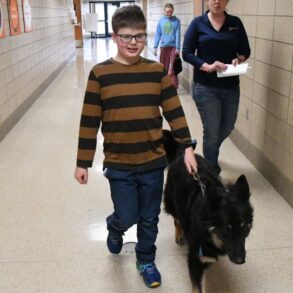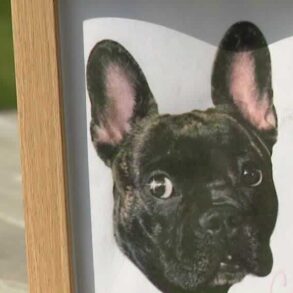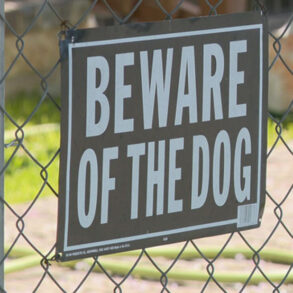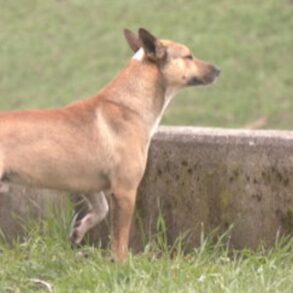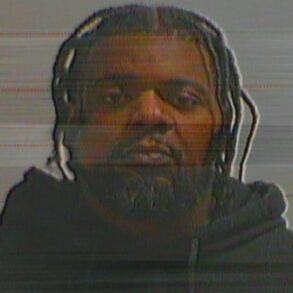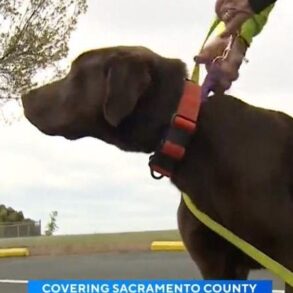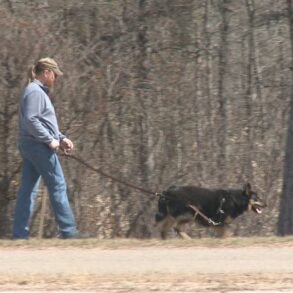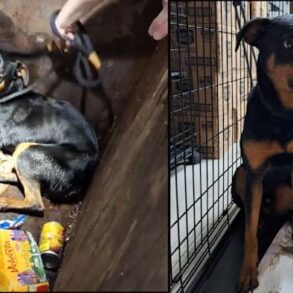
This Doctor’s Day, Health Matters shares the inspiring journey of a cardiologist whose experiences training his Border Collie to herd sheep highlight parallels with his medical career.
In this special episode of Health Matters, we celebrate Doctor’s Day. Dr. David Slotwiner, Chief of Cardiology at NewYork-Presbyterian Queens, shares how he balances his life at the hospital with a new hobby: herding sheep with his Border Collie named Cosmo. As part of an ongoing series this year, Dr. Slotwiner is our first highlight in showcasing doctors’ hobbies!
Episode Transcript
Courtney: Dr. David Slotwiner is the Chief of Cardiology at NewYork-Presbyterian Queens. As an expert in electrophysiology, he treats patients who have an irregular heart rhythm — people who may need a pacemaker or defibrillator, or other care involving the electrical activity of the heart that keeps it beating. And in his role as Chief, his days can be long and demanding.
But Dr. Slotwiner has learned key lessons in leadership, perseverance, and problem solving from an unlikely place.
Dr. David Slotwiner: We are here in Hackettstown, New Jersey, at Wayside Farm with my border collies Cosmo, four year old, and Luna, who is one year old, and we are herding sheep, which is what I love to do when I’m not at work.
Courtney: Welcome to Health Matters, your weekly dose of the latest in health and wellness from NewYork-Presbyterian. I’m Courtney Allison.
In celebration of Doctor’s Day on March 30th, we are getting to know one of our many inspiring doctors here at NewYork-Presbyterian. We will be sharing more of these special episodes throughout the year.
Today, we’re taking a trip outside the hospital to learn how Cosmo and Luna have made this Chief of Cardiology a better doctor and leader.
Let’s go back out to the farm…
I’ll follow you.
Dr. David Slotwiner: Watch out for the ice. Now Luna still doesn’t know most of the basics. Usually I would have her wait… I’m still gonna make her wait, though, because she has to know I’m in charge.
Courtney: Right.
Dr. David Slotwiner: Okay, Luna, stand. Okay, why don’t you go through.
Courtney: Ok!
So, Dr. Slotwiner, could you tell us who you are, and tell us where we are today?
Dr. David Slotwiner: Sure. So I am a cardiac electrophysiologist. I am Chief of the Division of Cardiology at NewYork-Presbyterian Queens and Assistant Professor at Weill Cornell Medicine in Health Policy and Research and the Department of Medicine. I think I got that all right. I don’t usually think of that while I’m here on a sheep farm in New Jersey surrounded by sheep and dogs, so it doesn’t come naturally to me at this particular location. Usually at this point, I’m focused on the dogs and making sure that they listen.
Courtney: And this is Luna, right? Can you tell us about Luna? And also maybe a little bit about Cosmo as well?
Dr. David Slotwiner: Sure. Yeah. This is Luna. She is 1-year-old. She is a border collie, as is Cosmo. Her parents are both top working dogs in sheep herding. And she’s just starting on sheep now and we’re really excited to get her started. She’s just learning the basics still. So she’s gonna work very close to the sheep today.
Cosmo, our first border collie, we got during the pandemic when there were no rescue dogs available. And I’d always wanted a border collie ’cause I knew they were smart and I wanted to have a very – I wanted a dog that I could have a real relationship with. And Cosmo comes from two parents who are working dogs on a sheep farm and very, very difficult working dogs.
So when he got to be about four or five months old, we started seeing some real aggressive fear, aggression, and dominance behavior that our trainers admitted they didn’t know how to deal with. And so we saw a few different trainers, and finally one of them who we’re forever grateful said, look, you need a border collie expert. And let me do some research and she found Wayside Farm. And so we came out here and immediately it changed Cosmo’s behavior and we recognized that they had the skills to guide us and how to take care of him and how to help him have a fulfilling life and be a good pet as well as a working dog.
And I just fell in love with the farm and the whole working border collie sheep farm set up and that relationship. So I’ve been coming out here whenever I can ever since, and that’s why we got Luna and don’t tell my wife, but I’m sure that we’ll have another border call in the not too distant future.
Courtney: So what is sheep herding for dogs? Can you describe it a little bit?
Dr. David Slotwiner: It really is about shepherds taking care of their dogs and so it’s really about protecting the sheep and being a good caregiver for the sheep.
And so the objective of herding is to take that basic instinct of border collies, which is to gather the sheep and bring them to you and use that willingness of the sheep to then train other behaviors to drive them where they need to be and and protect them and be a good shepherd.
Now here, there’s a whole world of border collie competition, sheep herding competitions. I’ve not succeeded in winning any medals yet, although Cosmo has, but that’s on my list of goals.
That’s what we do here mostly because obviously I don’t have a farm yet and I don’t have my own sheep. So this is more about building the relationship and having fun with the dog and of course always making sure you take good care of the sheep.
Courtney: So you mentioned Cosmo’s learned a lot and changed through this. Can you talk about what you maybe have learned through this experience and how it’s changed you?
Dr. David Slotwiner: Yes. Yes. Sure. Well, dogs really like a calm, confident leader and being around sheep definitely takes some getting used to for me. So it’s taught me how important what I do is on how Cosmo acts – and not just for Cosmo. And I think that tends to be true for every walk of life.
The dog is really a mirror of your behavior and your confidence and skill. And so it’s helped me focus on being those and acting and believing and being confident in my actions, so…
Courtney: Right. Well, because you’re also a leader at the hospital.
Dr. David Slotwiner: Yes.
Courtney: So is there anything that’s informed, I guess, both in leadership at the hospital, but maybe even in patient care, I’m curious?
Dr. David Slotwiner: Yes. Well. You know, I think each dog is different, but dogs do like firm, strict boundaries. And that’s not my natural leadership style. I really enjoy my colleagues and helping them succeed, getting them what they need and helping younger colleagues move up. But I think it helps me recognize that you have to be very clear on what’s indicated, what’s necessary, what you want, which may be clear to you, but it isn’t always clear to people around you. Or it’s certainly not dogs. And so it just helps me reflect on myself and how that comes across to people who I need to lead.
Courtney: Yeah. How about patients? Anything with patient care or clinical care that you can kind of translate?
Dr. David Slotwiner: Yeah. Well, what I love about getting to know dogs is how they’re just as individual as people. And they all come with their own background and stories, and I’ve always loved that about medicine because of course that’s true with people. And you see how your actions influence how people around you feel comfortable discussing those and understanding that about patients is really critical to helping them reach decisions that are most effective for them.
Courtney: Yeah. I also, I can just say, you know, from living in the city, being out here in this rural area on a farm, I’m already like taking a big, deep breath.
Dr. David Slotwiner: What I really love about being at the farm is the different world that I’m in. Because I’m with farmers and people of all different walks of life. And this gives me an opportunity to spend time with people in totally different backgrounds. And I think that really helps me be a better doctor, appreciate different backgrounds better, and it’s just a lot of fun.
Courtney: It’s a good stress relief, too!
Dr. David Slotwiner: It is a good stress relief, although it’s very humbling. You’ll see. It is incredibly hard to herd sheep with dogs. Like anything, people who are really good at it make it look really easy. But it does not come naturally to me. And so it’s, it’s been a long, learning experience.
But I’m getting better and I’m gonna win a competition at some point, I am – I’m sure of it.
Courtney: Well, I can tell Luna is very excited to go herd some sheep, so I’m not gonna keep you anymore, but thank you so much.
Later, Dr. Slotwiner sat down to talk a bit more about his time on the farm and his leadership takeaways.
Dr. Slotwiner, it was so great watching you on the farm that day with the sheep and the dogs.
Dr. David Slotwiner: Yes.
Courtney: And what struck me is the communication between you and the dogs. Can you talk about how communication and problem solving relate to both the farm and maybe your career?
Dr. David Slotwiner: I think when you’re learning a new language, whether it’s healthcare or speaking the language of border collies and the farm and herding, it just takes time and repetition and putting in your dues.
It’s really about gaining a deeper understanding of how to fix the problem. So with Cosmo, you know, it was not only a lot of trainers, but it was a lot of reading, a lot of seminars.
I think that the greatest parallel for me in my career is problem solving. I think the one that really comes to mind with me is – has to do with pacemakers and defibrillators and managing the data.
About 20 years ago, when I started this, remote monitoring for pacemakers and defibrillators was really just starting to take off. And it was becoming clear that managing the enormous quantity of data that these devices produce was going to be challenging.
And so I was challenged by how we could figure out a paradigm to handle this data in an effective way because these are lifesaving devices and we really need to be able to make sure we get the data and we process it effectively.
We really need to do this in a standardized approach. And so that led me to become interested in data standards and information technology and that set me on the pathway of working through our national organizations and international organizations. And so that’s been a problem that I’ve been working to solve for 20 years, almost 20 years.
With Cosmo, you know, it hasn’t taken quite that long to get on the track. We all really are dealing with remarkably similar challenges and joys and opportunities, and it’s really great to have a foot in both worlds. And I just feel very honored and very lucky.
Dr. David Slotwiner: Good boy, Cosmo. Good boy. Yes. Like that? Okay. Yeah. Good boy, Cosmo!
Courtney: What’s your favorite part about all of it? It’s just clear you’re so passionate about it. What’s your favorite part?
Dr. David Slotwiner: I love the dogs. I just love the way they look at their handlers. You become their world and that relationship is really what I love.
Courtney: Thank you so much, Dr. Slotwiner. It was such a pleasure talking with you and meeting the dogs. It’s been such a wonderful experience. Thank you.
Dr. David Slotwiner: Thank you for having me!
Courtney: Our many thanks to Dr. David Slotwiner. I’m Courtney Allison.
Health Matters is a production of NewYork-Presbyterian.
The views shared on this podcast solely reflect the expertise and experience of our guests.
To learn more about Dr. Slotwiner’s work with patients, check out the show notes.
NewYork-Presbyterian is here to help you stay amazing at every stage of your life.
To get the latest episodes of Health Matters, be sure to follow and subscribe on Apple Podcasts, Spotify, or wherever you get podcasts.
Share This Story
This post was originally published on this site be sure to check out more of their content.

